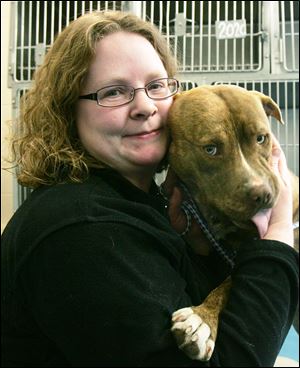
Project aims to aid 'pit bulls'
Grant to help defray the cost of spaying or neutering dogs
4/19/2011
Lucas County Dog Warden Julie Lyle holds a ‘pit bull’ that pound personnel named ‘Amos’ after he arrived in 2010. She says that ‘pit bulls’ and ‘pit bull’ mixes are by far the highest numbers of animals her agency deals with, and ‘if they continue to reproduce on the street, we’re not taking care of the problem.’
Despite successful adoption programs and help from local pet groups, the numbers of “pit bulls” in the Lucas County pound is still “out of control,” authorities said.
But with the help of a new program, “pit bull” owners can be a part of the solution by spaying or neutering their animal at a much lower price.
The Lucas County dog warden was awarded a $38,400 grant through PetSmart Charities to help defray spaying and neutering costs. In partnership with Humane Ohio, the county is offering spay and neutering services for up to 500 “pit bull” or “pit bull” mixes for $5.
Included in the cost of the “Fix-a-Bull” program is a microchip to help reunite a lost dog with its family.
“Pit bull and pit bull mixes are by far the highest number of animals we deal with,” said Dog Warden Julie Lyle. “… If they continue to reproduce on the street, we’re not taking care of the problem.”
Announced Monday, the program is open to any Toledo resident who has a licensed “pit bull.” To take advantage of the reduced rate, owners must prove residency and show that they have a valid Lucas County license in which the breed is listed as “pit bull” or “pit bull” mix.
Then, by calling Humane Ohio — a local nonprofit, low-cost spay-neuter clinic and pet-food bank — owners can arrange an appointment for the surgery. The first of the appointments already is set for Thursday, Ms. Lyle said.
Jean Keating, president of the Ohio Coalition of Dog Advocates, acknowledged that many “pit bull” owners still are wary of dealing with the county. But she said relationships are at “an all-time high from where we’ve been over the years” and she hopes owners will take advantage of the program.
It will also get owners into compliance with a recent and not-yet-enforced Toledo ordinance that requires all “pit bulls” to be spayed or neutered.
“It’s a terrific program to help people get into compliance,” Ms. Keating said.
“There are so many unwanted ‘pit bulls.’ And the number of dogs being euthanized in Toledo is horrendous,” she added. “I’m hopeful that people will take advantage of it because it will definitely help reduce this population, and that definitely will help end the killing [of the dogs.]”
Ms. Lyle said that more than 40 percent of the dogs taken in at the dog warden’s office this year have been “pit bulls” or “pit bull mixes.” Of those, only 11 percent of the strays have been claimed, she added.
That’s why microchipping is a part of the grant, she added.
But to participate, “pit bull” owners must be honest and “call a spade a spade,” Ms. Lyle said. And she hopes that any distrust “pit bull” owners once had with the county will dissipate and that they will take advantage of the opportunity.
“We need them to be up front,” she said. “It’s not a terrible thing to have a “pit bull” in the city of Toledo. It’s OK. We just need to make sure they are licensed appropriately, and let’s get them spayed or neutered.”
Established in 1994, PetSmart Charities Inc. is an independent nonprofit organization that has provided $110 million in grants and programs nationwide to save the lives of homeless pets and raise awareness of animal-welfare issues. It has focused most recently on targeted spay and neuter programs, which zero in on a particular breed or ZIP code within a community.
Aimee St. Arnaud, a program manager for the charity, said target programs have proven successful nationwide. She said that part of the local program is to help reduce the local stray population while revamping the image of “pit bulls” and their owners.
“In general, the majority of the dogs we see roaming and biting are unaltered dogs,” she said. “Also, people are going to see that there really are good ‘pit bull’ type owners.”
Ms. Lyle emphasized that in addition to helping to curb over-breeding, spaying and neutering a dog can help reduce some health risks — such as some types of cancers — which can affect intact dogs.
County Commissioner Tina Skeldon Wozniak said the program is a proactive way of tackling the “pit bull” population by addressing it at the front end.
“The bottom line is, prior to having to have too many puppies that are then placed in shelters, a more humane practice is to spay and neuter,” she said. “At the end of the day, the goal is that every dog has a home.”
To take advantage of the program, dog owners can call Humane Ohio’s low-cost spay and neuter clinic at 419-266-5607 to schedule an appointment. Owners must provide proof of residency and dog license and must mention the Fix-a-Bull program.
Contact Erica Blake at: eblake@theblade.com or 419-213-2134.